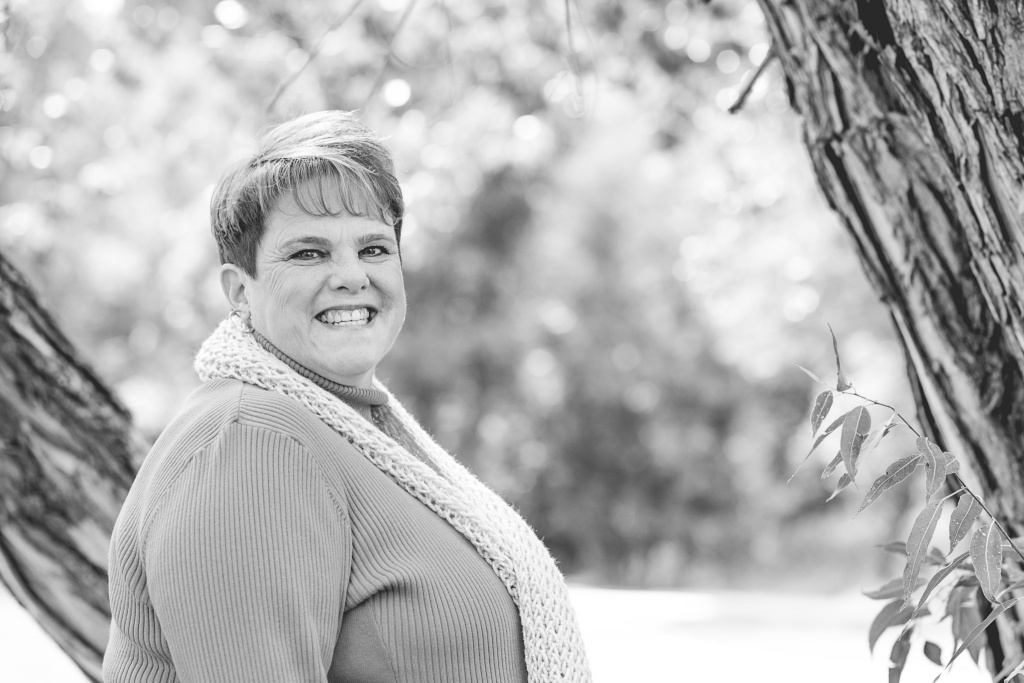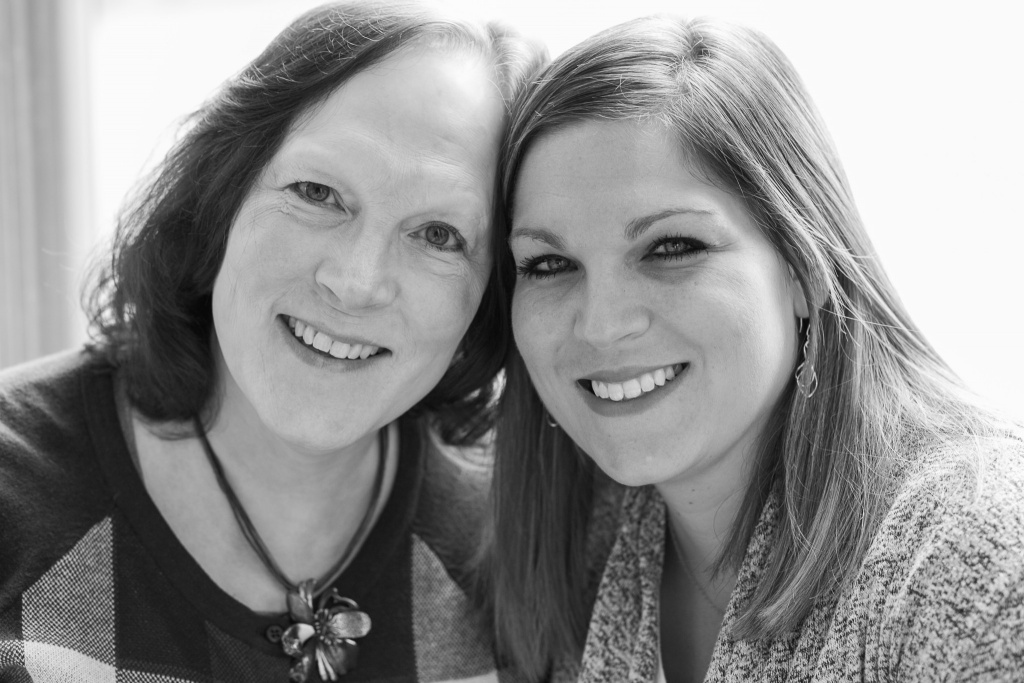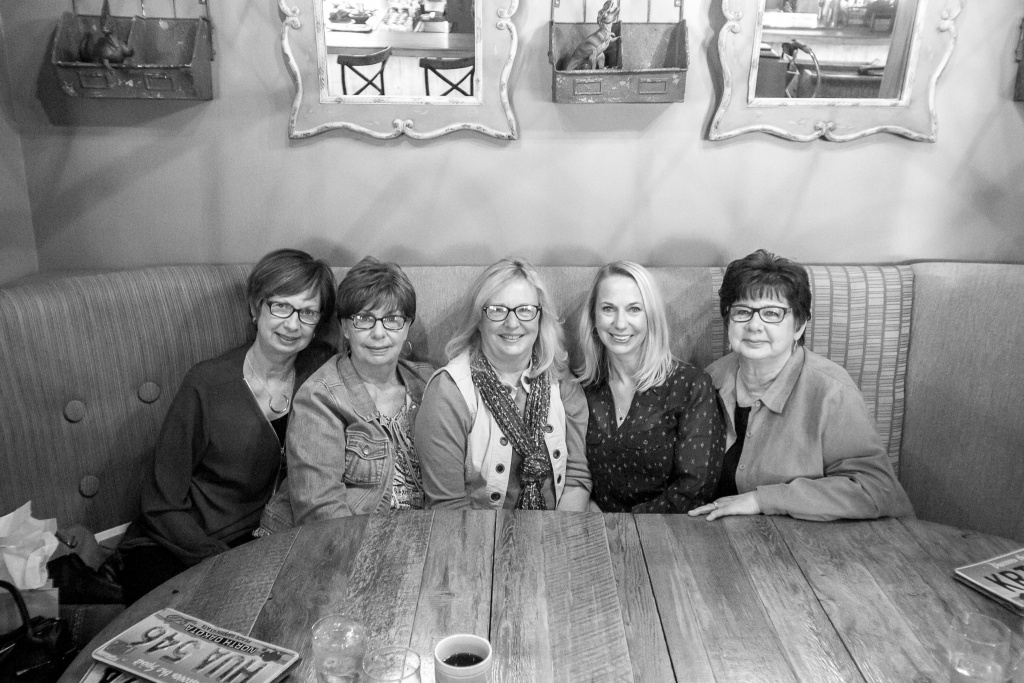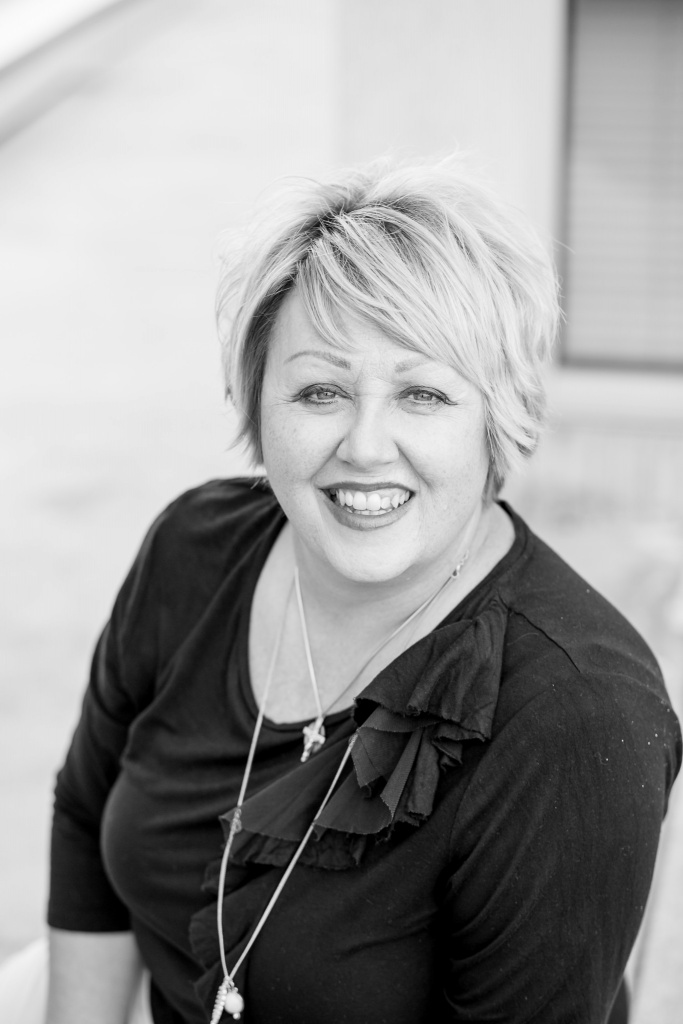“Breast cancer changes you, and the change can be beautiful.”
-Jane Cook, breast cancer survivor
The women you’re about to meet have all had their lives changed by breast cancer. Their stories are different, yet similar. All of them are fighters; some have fought the ugly disease head on, others have taken steps to make sure they never have to. It’s in their genes, both breast cancer and that fighting spirit. Their stories will inspire you, make you want to call your mom or sister, and hug your daughter. Because if there is one thing these women all know for sure, it’s that life is precious and should never be taken for granted. Breast cancer has changed them. It has made them stronger and more beautiful than they were before.
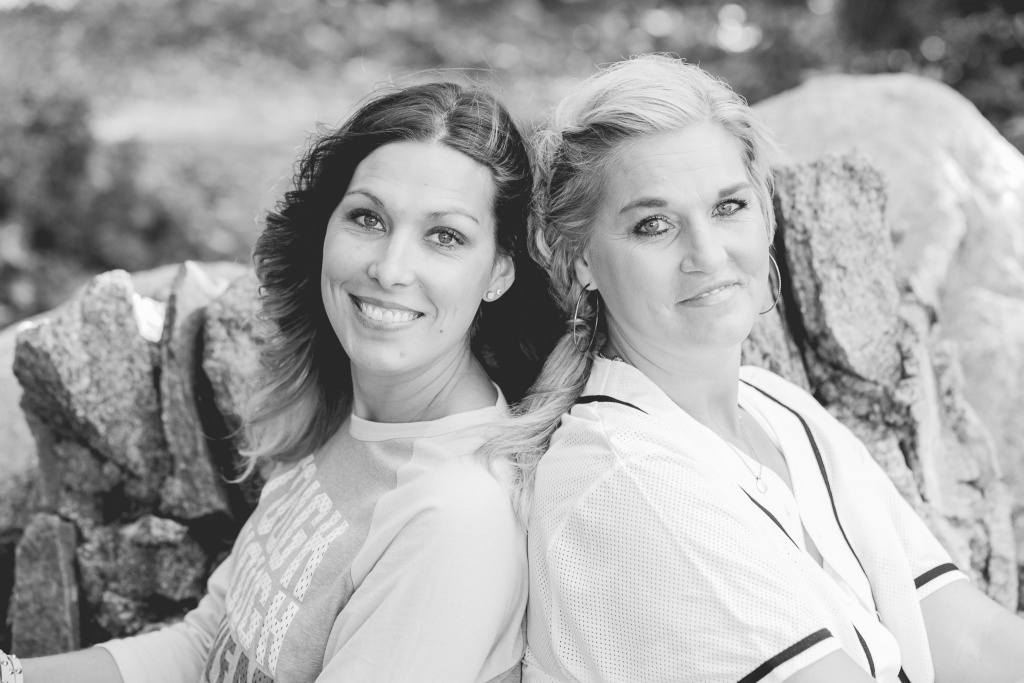
Sarah and Michelle
By Jody Kerzman
Sisters have a special connection, but perhaps no sisters have a connection quite like Sarah Krikorian and Michelle Waldner.
Both women are wives and mothers, both are raising young daughters, both have had hysterectomies and double mastectomies. Sarah is 39. Michelle is 34.
“I had a total hysterectomy and entered menopause at age 32,” says Sarah. “Two years later I had a double mastectomy.”
“I had a total hysterectomy at age 30,” says Michelle. “I had a double mastectomy at age 32.”
The sisters opted for these major medical procedures after watching their mom die of breast and ovarian cancer. Sarah went through genetic testing, and when she tested positive for the BRAC gene, she scheduled her procedures. It took Michelle a little longer to do the testing.
“I knew the results of the genetic testing wouldn’t change my decisions on doing the surgeries,” says Michelle, whose mammograms and breast MRIs were always producing new scares.
Their mom, Joyce Fetch, battled cancer for 11 years. It was a car accident that led to her original breast cancer diagnosis.
“She was rear ended and had really bad neck problems,” remembers Sarah. “She finally had a breast reduction, hoping that would help with her neck pain. That’s when they found a one centimeter lump in her left breast.”
She immediately had a mastectomy and breast reconstruction. Joyce knew breast cancer can run in the family, and she was worried about her daughters and her granddaughters. Joyce’s mom died of breast and ovarian cancer when she was in her 40s, so Joyce wasn’t surprised when she tested positive for the BRAC 2 gene. But her fight was far from over.
Five years to the day of her breast cancer diagnosis, Joyce was diagnosed with stage four ovarian cancer. She was given a 10 percent chance of survival. Joyce fought for six years. She passed away August 22, 2010.
By October 2010, Sarah was going through genetic testing. When she learned she also carried the BRAC 2 gene, she scheduled her surgeries.
For Michelle, the decision wasn’t as easy. Her hysterectomy was due to medical issues, not a cancer scare. But shortly after that, Michelle was diagnosed with dense breast disease.
“I kept finding lumps and spots. I was constantly having mammograms and MRIs,” says Michelle. “I had so much anxiety going into all my appointments that finally I just said ‘Take them off. I can’t handle this anymore.’ The unknown was driving me crazy.”
She soon decided to have genetic testing too.
“After I found out I had the gene I was way less stressed. I knew what I had to do,” says Sarah. “My kids won’t watch me die.”
Sarah has three daughters; Michelle has two young daughters; And their older brother, Jason, has three daughters.
“Mom called the girls her ‘crazy eights,’” says Sarah. “She would have loved to see them grow up. There is some guilt; I used to feel guilty that I didn’t do the testing sooner. I thought I should have just stayed single and never had kids. What did I do to my girls?”
“We had an amazing mom,” remembers Michelle with a smile. “Sure there is some guilt, but we could never have not had kids. She taught us how to be moms. We had a loving mom for the length we had her. We had her as an amazing role model.”
Which is why Michelle and Sarah are determined to help others, including their daughters. It’s what their mom would have wanted.
“I need to show my girls that I am not embarrassed. That I fought for something,” Sarah says. “My scars are my battle scars for them. I did it for them, so I would be around to see them grow up.”
Before her surgeries, doctors told Sarah she had a 97 percent chance of getting cancer. Now, her chances are just three percent.
“That’s because of what I did. I did that,” says Sarah. “I changed those chances. We are survivors of a cancer we never had. We are pre-vivors.”
Their advice to others, Michelle says, comes straight from their own mom.
“Mom always told us you know your body best. She knew if something wasn’t right. If you feel something isn’t right chances are it is not. Always get things checked. It is better to be safe than sorry.”
“Do the testing,” says Sarah. “It’s your life, and you only get one shot at it.”
“But wait until you’re ready,” adds
Michelle. “That is why I waited until after my surgeries to get tested. The result is a life changing answer. Just make sure you are ready. Know your options and have a great support team.”
For Michelle and Sarah, that support team included their husbands, their families, each other, and their older brother, Jason.
But while Jason was a source of strength for his sisters, he knew he was at risk too. Because of his family history, and because men can get breast cancer too, Jason recently had his first mammogram. He happily reported his results to his sisters: his doctor gave him a clean bill of health, something this family knows never to take for granted.
Click here to see a full gallery of images of Sarah and Michelle taken by Photos by Jacy.
Tara Lacher
By Marci Narum
You just never know.
You never really know once you start something…where it might lead. Tara Lacher understands that now. Ten years ago she started her own non-profit organization, My Pink Scarf, Inc., knitting and giving scarves to any woman diagnosed with cancer. Tara says at the time three family members were being treated for cancer.
“I wanted to make a difference in their lives or just make a day better for them,” Tara says.
Since starting My Pink Scarf in October 2006, Tara has given away more than 9,000 scarves to women in 35 states and 14 countries. More than 1,000 women are on a waiting list to receive one. Her next scarf is headed to Greece.
“I knew that I could touch people’s lives by knitting. This whole thing started by one scarf. And here we are today. Who would have guessed it would have taken the turns and twists and be what it is today?”
Because you just never know.
She had done all that knitting. Weaving together many thousands of miles of yarn to create scarves. But Tara discovered a string she needed to pull on. And when she did, things began to unravel…in a wonderful way.
Diagnosed with thyroid cancer in 2007, Tara spent a lot of time seeing doctors. At every appointment she was asked the same questions over and over about her health and medical history. Tara grew tired of never having the answers. Because she just never knew. She had been adopted as an infant.
“I have always wondered because I have two daughters. We know that there is a possibility that cancer runs in our family because I had it. I wanted to find out if my daughters should be pre-screened and be aware of anything.”
So Tara pulled on the string. With some patience and the help of a social worker, Tara discovered who her biological mother was. By then, in 2012, it was too late. Delores had died a year earlier. A short time later the social worker found two other family members, her mother’s sisters. Florence lives in Sidney, Montana and Loretta in Bismarck.
Now Tara could stop pulling on that string. She had the answers she needed. She learned that three biological family members had breast cancer, including her two aunts.
“They were so glad to meet me. It was truly an inspirational meeting. They are wonderful ladies. I remind them of their sister, so it’s bittersweet for them. I gave each of them a scarf and they are very touched by what I’m doing.”
And now Tara knows.
“I would never have dreamed of finding my biological family but I’m eternally grateful because now my kids know going forward medically, so they can get screened.”
Click here to see a full gallery of images of Tara taken by Photos by Jacy.
Jan Lund
By Marci Narum
Jan Lund still gets emotional when talking about her fight with breast cancer. Her daughter Sarah Lund wipes away tears as she recalls the experience too.
It started nearly ten years ago, when Sarah was planning her wedding. Her then-fiancé’s mother had recurring breast cancer at the same time. It was terminal.
“We were very close and it was difficult having both of them going through it at the same time,” Sarah says, her eyes welling with tears. “We had just gotten engaged. I was in Salt Lake with my then soon-to-be mother-in-law for her treatment and my mom found out about hers when we were out of town.”
“In March of 2007 I noticed some swelling in my right breast,” Jan explains. “I thought it was an infection or reaction to changing laundry soap or a lacey bra so I ignored it.”
But the swelling and breast pain didn’t go away and they didn’t get better. So Jan had it checked out. The inflammation was misdiagnosed twice—first, as a breast infection, and later as a cyst and fungus. Jan finally underwent a surgical biopsy in mid-June. That’s when her cancer was correctly diagnosed and her oncologist confirmed it was Inflammatory Breast Cancer, a rare and very aggressive form of cancer not detected by a mammogram or ultrasound.
Jan says she was ready to write her obituary. The odds were not in her favor.
“I had a 40 percent survival rate in 2007,” Jan says.
But she also had Sarah, whose recent experiences had taught her about breast cancer, its forms, and its stages.
“When I was told there were four stages, mine was stage 3b,” Jan says. “Sarah said, ‘Mom that just means it’s in your skin.’”
Jan admits she was angry. She liked being in control. But being diagnosed with Inflammatory Breast Cancer made her feel suddenly not in control. Jan was determined to keep her diagnosis quiet and avoid all the pink ribbons and publicity of breast cancer awareness.
It was Sarah who helped her connect with the Relay for Life, because of her former and late mother-in-law’s involvement with it. Jan is now the local chair for the fundraising event and she shares freely about her experience with cancer. She offers support and encouragement to individuals and groups who ask her to speak.
“I did 12 weeks of chemotherapy, had a bilateral mastectomy, and then more chemo because the cancer was still there. Then I had six-and-a-half weeks of radiation and a year-and-a-half later, reconstructive surgery.”
Jan’s eyes fill with tears as she thinks about June 2017. It will mark her ten-year survivorship anniversary.
“Ten years is magic,” she says. “The takeaway of this is for women to be aware of their bodies, what’s normal for them and what’s not. My symptoms in hindsight, were just screaming. Why did I not listen that first day? And I swear, my symptoms were overnight. It’s that quick with Inflammatory Breast Cancer.”
Click here to see a full gallery of images of Jan and Sarah taken by Photos by Jacy.
Gert’s Girls
By Marci Narum
If you believe laughter is the best medicine, a dose of “Gert’s Girls”—JoAnne Skalsky, Sandi Blohm, Patti Schatz, Susi Horner, and Kristi Meuchel—might be just what the doctor ordered.
To see these five women together, one might guess they were old college friends; laughing, teasing, and hugging after spending years apart.
But they are more than friends. Gert’s Girls are sisters. Thick as they come.
“They are always like this,” says Patti’s daughter, Amber Schatz, giggling at the group’s antics as the Inspired Woman photographer tries to get them to settle in for a photo.
“My birthday is coming up and I’m going to be 60,” says Susi. “But that’s not going to be printed, is it?”
The sisters laugh hysterically.
Humor is part of who these women are. They say it’s also been critical to their healing.
Breast cancer has touched Gert’s Girls many times. Susi was diagnosed at age 38 and had a bilateral mastectomy. Patti was 44 when she got the news. She had a partial mastectomy followed by 24 weeks of chemo and six weeks of radiation. Both of them have been cancer-free for years. But their sister, Sandi found out late last year that she has breast cancer. She recently finished her treatment.
“Talk about having nice resources,” says Sandi. “Two sisters who have been through it already.”
These sisters also watched their mother go through it. Gert Pulver had breast cancer twice, plus renal cancer, and her mother died of breast cancer. Could it be something genetic? They have all wondered.
“When Mom got breast cancer she talked about how guilty she felt,” Susi says. “She knew it wasn’t reasonable to feel that way, but she still felt guilty that her daughters were ending up with the same disease she had.”
Cancer research and testing has come a long way since Gert’s first diagnosis in 1988, but there is no evidence of a genetic link among her daughters. Three of the women have had genetic testing for the BRCA1 and BRCA2 gene mutations, which increase the risk of breast and ovarian cancer and account for about 20 to 25 percent of hereditary breast cancers.
Their tests were all negative.
“My oncologist was shocked,” Patti says. “He couldn’t believe it.”
Even so, the family history of breast cancer among these sisters has made them diligent with their own daughters—14 between all of them—making sure they are screened early and educated.
“That’s why I had the genetic testing done, Kristi says. “I felt like for myself whatever will be, I’ll deal with it. But for my daughters, I wanted them to have the information. If they were at a higher risk I wanted them to know so they could make their choices.”
Amber says, “I did start getting tested for breast cancer annually. I get an MRI every year and my doctor recently recommended I speak with a genetics counselor.”
Genetic testing may not hold the answer to why breast cancer seems to run in their family, but Gert’s Girls do seem to have the solution for coping. And it doesn’t take genetic testing to prove its positive result.
“No matter what’s going on we can always keep a sense of humor,” Kristi says.
That just might be something they did get from their mother. Susi recalls taking Gert to a doctor’s appointment. Her mom was 71.
“She told the doctor, ‘sometimes when I get up in the morning the first thing I do is throw up. Then I feel fine for a while. I eat something and I gotta I throw up again.’” Susi continues, “She looked at him and she said, ‘you know what I think? I think I might be pregnant.’”
Gert’s Girls are laughing hysterically again.
“That was Mom,” Susi says.
Sisters. Humor. Good medicine.
Click here for a full gallery of images of the five sisters taken by Photos by Jacy.
Lisa Guenther
By Marci Narum
Lisa Guenther will mark her fifth year as a breast cancer survivor this month.
“I was told that you are considered a survivor from the day you are diagnosed. Because you survived the news that you have breast cancer,” Lisa says.
The news, the cancer, and the treatment were brutal for Lisa.
It started after a routine mammogram. Follow up tests revealed that Lisa’s breast cancer was estrogen-receptor- and progesterone-receptor-positive, which meant the cancer was likely to spread. She also tested positive for the HER2 gene, commonly referred to as the “demon cell.” It meant the cancer would grow quickly and had a high rate of recurrence. Lisa would be facing heavy treatments of chemotherapy.
“Chemo started on January 4, 2012 and continued all the way through December 28. I did six big treatments and I continued with Herceptin for the remainder of the year every three weeks. I had my ovaries out in May in between chemo and radiation. It was a tough year.”
Lisa was 43. She says God, friends, and family helped her get through those long, difficult days.
“I have six siblings. They each took a weekend to be with me and take care of me for four days after the treatment. The toughest one was my fifth chemo. I was in the hospital for ten days and my sister Jackie stayed with me. I couldn’t have done it without all of them. My kids were 15 and 12 at the time.”
Lisa recalls one of her hardest days. It was shortly after starting chemo.
“You lose your hair anywhere from 15 to 20 days after your first chemo treatment. It was a Saturday morning. I hopped into the shower and my hair started coming out in globs. I handed it out to my husband because I didn’t want it to go down the drain. And I cried and cried and cried and cried. And then I took my clipper and shaved it off myself. That was one of the toughest days. But I got through it.”
Any woman would struggle with the reality of losing her hair. For Lisa, it was not only a personal loss, but a professional one too. As a hairstylist for 22 years, she wondered what her clients would think, having a bald hairstylist. She chose to embrace it with humor. And then Lisa found purpose in it.
“I had a very powerful dream one night of what was supposed to come out of all of this,” Lisa explains. “I woke up and it was clear: wigs.
“I had some clients get cancer. They asked me if I could help fit their wigs. I’ve been doing wigs off and on for people ever since.”
Lisa gets referrals for wig fittings from the Bismarck Cancer Center and Mid Dakota clinic. She also volunteers for the American Cancer Society as the director of the Look Good Feel Better program. Lisa teaches the class about four times a year at the Bismarck Cancer Center.
“We talk about the skin changes that come with having chemo treatments. It’s a two hour period when women can be together and realize they aren’t the only ones going through it.”
Lisa says it’s also important to remember though, that every breast cancer diagnosis is unique.
“No two people are alike and have the same treatment. It doesn’t matter if your cancer is small on a big breast or big on a small breast. Every breast cancer diagnosis is unique and personal. It doesn’t discriminate.”
Lisa says she feels blessed and grateful to be cancer-free after five years. It means the recurrence of cancer for her drops 85 percent.
“I’ll be celebrating my five-year mark with my husband in Arizona. I’m treating myself. You can’t NOT celebrate a five year cancer diagnosis.”
Click here for a full gallery of images of Lisa by Photos by Jacy.

